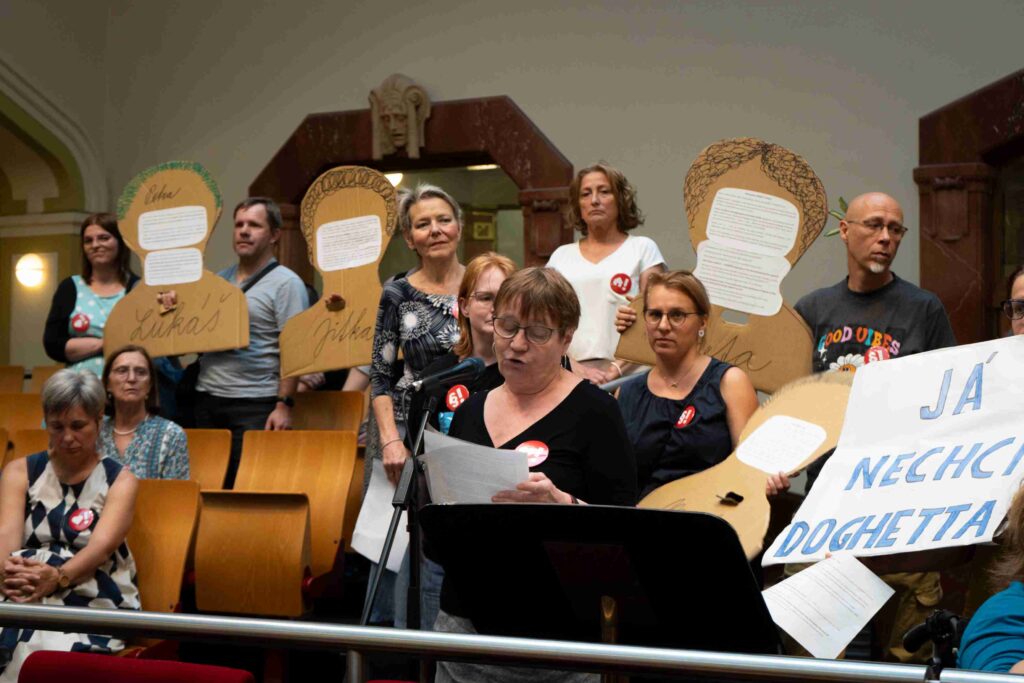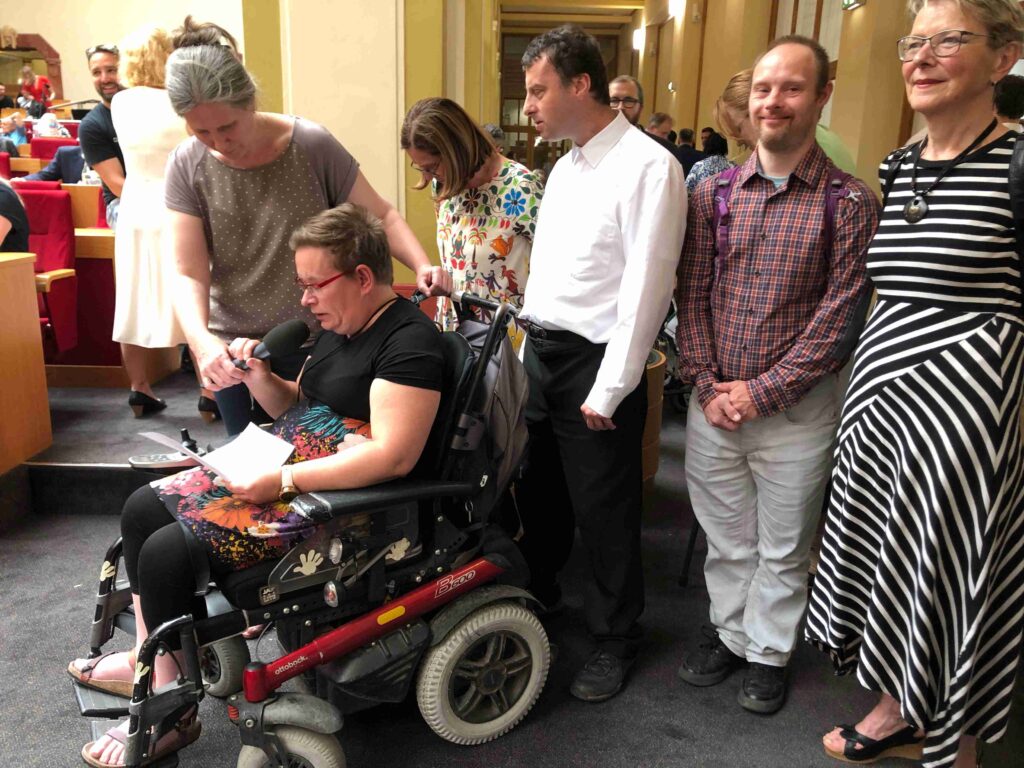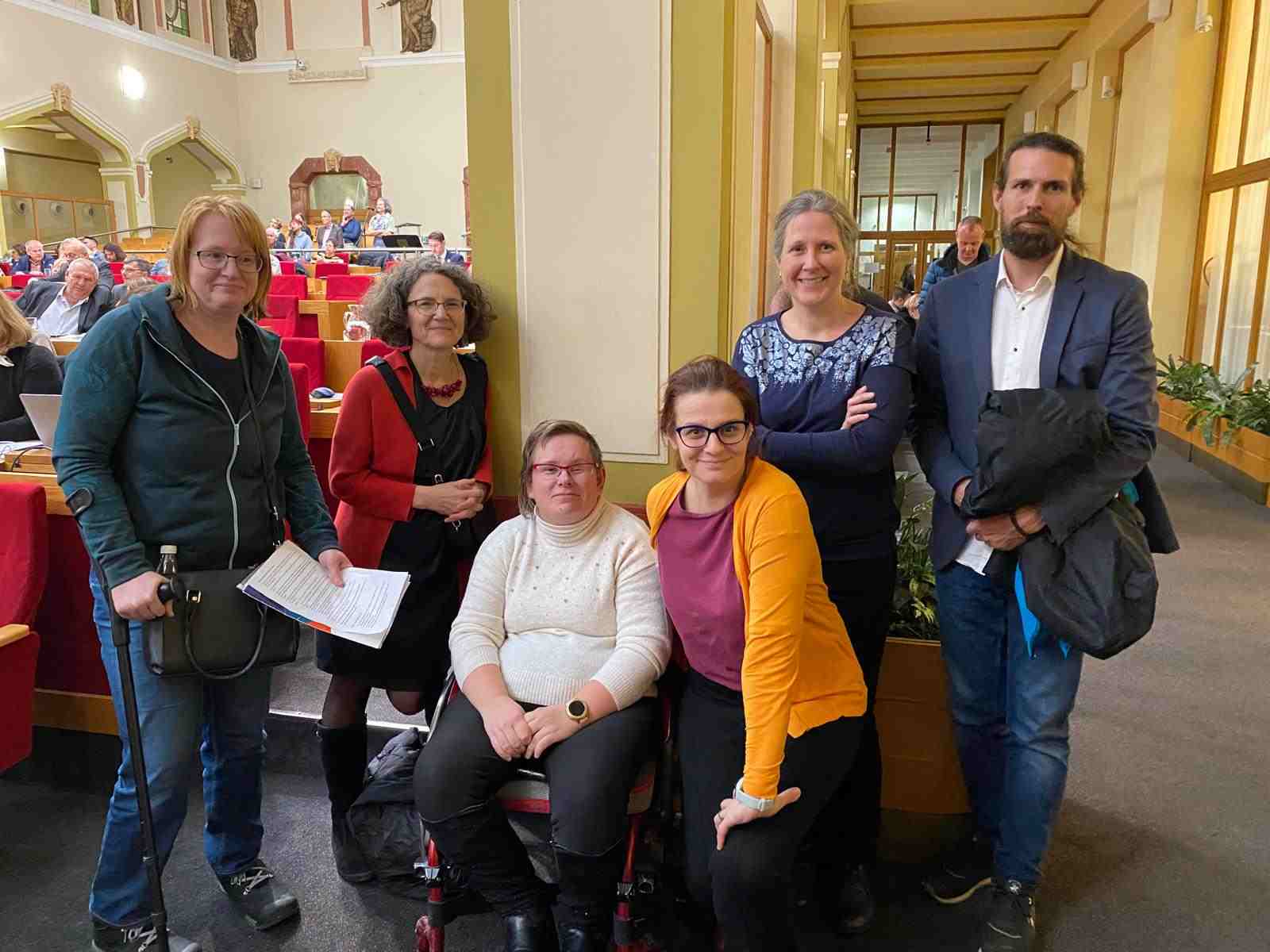Last June, the signature campaign against the construction of an institutional pavilion for Prague residents in the garden of an existing institute in Krásná Lípa (Ústí nad Labem Region) reached its peak. Members of the Prague Regional Advocacy Team, aka K.A.T. Praha, which was founded around the same time in participation project of the Alliance for Individualized Support. Thanks to the petition, two important topics were successfully pushed through at the June meeting of the Prague City Council: increasing the capacity of community social services in Prague and stopping the removal of Prague residents with disabilities to the borderlands, the former Terezín barracks, or the Křivoklát forests. It was the first and quite big event for K.A.T. Praha.
On this occasion I had the opportunity to help a group of five parents and people with disabilities who make up K.A.T. Praha. My task was, among other things, to help them navigate the jungle of Prague politics and to find ways to get involved in the creation of social policy – to participate, so to speak. It’s our anniversary in June and I can say that it’s been quite a ride for me, and I’ve learned some important lessons – and not just from me.
He has the sense to get involved. It makes even more sense to engage together.
K.A.T. Praha was not the only group involved in collecting signatures and appealing to responsible public institutions to prevent further growth of the extra-Prague capacity during last spring – the matter was addressed by influential NGOs and the Public Defender’s Office. The issue resonated in the media and was known not only in Prague, but also in the Šluknov region, from where a delegation came to the June meeting of the city council.
And the result? The Ministry of Labour and Social Affairs did not approve the subsidy for the construction, citing the same problems that were pointed out in the petition. The capital city has not yet dared to start construction with its own money. So the new institute is not being built!

There is a fundamental difference between advocacy and participation. We need to talk about it.
While advocacy requires one party that wants to make a difference, participation requires at least two parties that want to make a difference in partnership. For the whole year in Prague we have not managed to reach even the lowest rung of the imaginary participation ladder. Members of K.A.T. Prague have encountered manipulation (that’s not true, you lie), intimidation (I wouldn’t be surprised if someone filed a lawsuit against you) and “participation by eye”, which is also called tokenism (yes, send us your comments, we will do with them what we see fit).
Participation occurs when the public administration delegates part of its power to citizens and, for example, when. invite them as full members of advisory and supervisory bodies, or even give them full confidence to decide on matters that concern them – e.g. how to use city funds to develop social services. The Prague City Council does not know about this difference and does not want to know, so they thank the members of K.A.T. Prague for their participation, which has not yet occurred. Awareness is necessary.

Providers cannot represent the interests of service users. Due to a conflict of interest.
One of the things that K.A.T. Prague members have been striving for all year was full representation of people with disabilities and caring families on the Prague City Council Commission for Planning and Financing of Social Services. There have been consistent reports from politicians and officials that they have representation there. However, there was never any information about who exactly that representative is, which in itself means that there is simply no representation. The city representatives probably suspect that it is not right to think that people with disabilities can be represented by a manager who uses social services herself but defends the interests of providers on the commission, so they avoid answering. The concerns are justified, social service providers are in this case in conflict of interest with their clients.
Pavel Mička from the Office of the Government of the Czech Republic described it nicely at a conference organized by the Alliance for Individualized Support in June when he shared an older experience of his: in an unnamed municipality, as part of community planning, they discovered that people would not have to take lunches from social services if the schedules were changed and they could get their own food. They started to deal with it right away because it was a measure that wouldn’t cost anything. And lo and behold, local providers responded with a complaint to the MoLSA to the effect that the project was misusing funding for planning outside of social services. And yes, we in Prague have also had the experience that the interests of the providers are usually different than the interests of the users. One exemplary example is the desire of the now former director of the institute in K. Lípa to build a new pavilion in her garden – for Prague residents who really don’t want it.
It can be said that in one year of being in K.A.T. Praha its members did not achieve everything they wanted. On the other hand, these lessons in advocacy and (in)participation are definitely worth it. I am glad I could be there.


